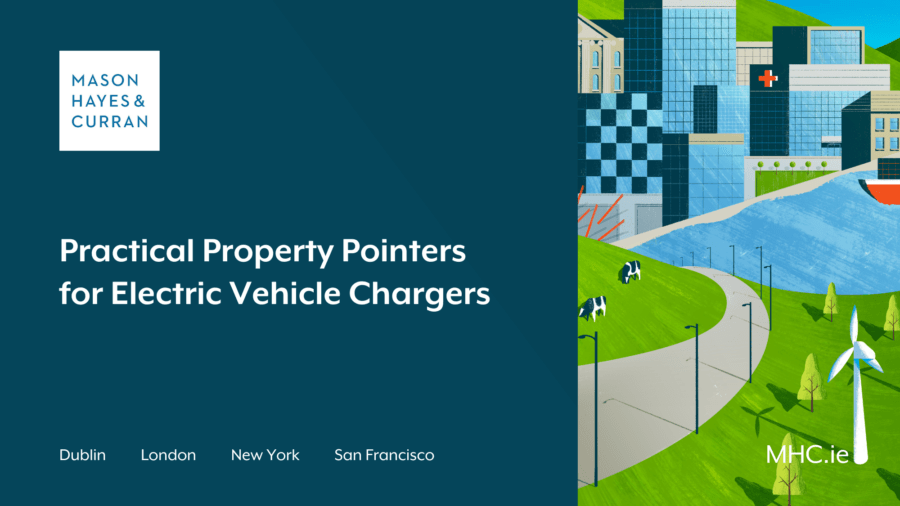
Over 15,000 electric cars were registered in Ireland in 2022, a jump of 83% from 2021. More accessible fast-charging stations will be needed to ensure the move towards a more sustainable transport sector is achievable. Vanessa Byrne, Co-head of our Real Estate team, highlights some key property law considerations for electric vehicle charging hubs.
Ireland has committed to halving our greenhouse gas emissions by 2030 and to reaching net zero by 2050. The transport sector plays a key role in the Government’s plans to reach these objectives. It has set a target of having 180,000 electric vehicles (EVs) on the roads by 2025 and 936,000 by 2030. You may have noticed charging stations popping up around the country. However, if these ambitious targets are to be reached, many more public charging stations will be required to meet demand and make purchasing EVs more appealing and practical for consumers. We discuss some of the property law considerations when installing an EV charging hub on your own or another’s property.
EV hub operators (Operators) are seeking land agreements with the owners of land prime for the installation of charging stations such as:
- Service stations
- Retail parks
- Business and industrial estates
If you own premises like these, you could consider letting part of your property to an Operator. In addition to adding a further rental revenue stream, EV charging hubs have the potential to draw consumers and/or other tenants to your premises.
Lease v licence
The form of agreement used for an EV hub is usually a lease, though a licence may also be used. From the Operator’s perspective, a lease grants stronger protections and protection against eviction. Licences are usually revocable on notice and do not grant exclusive possession of the site. As the start up costs for an EV hub are high, with construction, planning permission, grid connection, etc., an Operator will want to ensure it has a secure term of occupation to recover its initial capital expenditure.
Options and agreements for leases
Prior to entering into a lease, the Operator will apply for planning permission and a grid connection for the EV hub. It will want to lock in a right to take up a lease of the proposed site once the necessary consents are in place. It can do this by putting in place an option for lease or an agreement for lease. By entering into these types of agreements the landowner agrees to reserve the proposed site for a period of time and when called upon to do so or when certain conditions are met, to grant a lease to the Operator. The suitability of each agreement should be considered in the context of each development.
Some key points to consider
Substation and cables – The chargers may require a new electricity substation. This is often located at the perimeter of the car park. Depending on the site, an electric cable may need to be installed between the chargers and the substation. The lease should grant a right to install and maintain this cable.
ESB requirements – Under the grid connection agreement, the ESB may require cables and/or the substation constructed for the EV hub to be transferred into its ownership. The ESB may require the freehold of the substation site to be transferred to it by the landowner, together with any necessary easements. This should be agreed from the outset and provided for in the land agreements.
Rent – The rent payable under the lease can take any form agreed by the parties. For example, rent can be
- A fixed sum
- A fixed sum subject to periodic rent reviews
- A percentage of the profit generated by the charging stations, or
- A hybrid - eg fixed rent for the first five years and then an option for the landowner to stay at the fixed rent or to opt for a percentage of the profit
Exclusivity – To protect its investment, an Operator may wish to secure an agreement that the landowner will not allow another Operator to install EV hubs on the landowner’s property. Exceptions can be agreed, for example, where the chargers are for private use or where the chargers are below a certain power or speed.
Service charge and insurance – the Operator should maintain its own public liability insurance for the leased site. The landowner may require the Operator to contribute to the service charge for the maintenance of the park/estate. This may involve a contribution to the common areas’ insurance.
Conclusion
The provision and operation of EV charging stations is set to grow exponentially over the coming years to keep pace with the uptake of electric vehicles. As the accessibility of high-speed charging stations increases, it will in turn encourage more people to make the switch to an electric car. This is creating an opportunity for both Operators and landowners to participate in the electric vehicle revolution.
If you would like to discuss putting in place a land agreement for an EV charging station, please get in touch with our Renewable Energy or Real Estate team.
The content of this article is provided for information purposes only and does not constitute legal or other advice.






